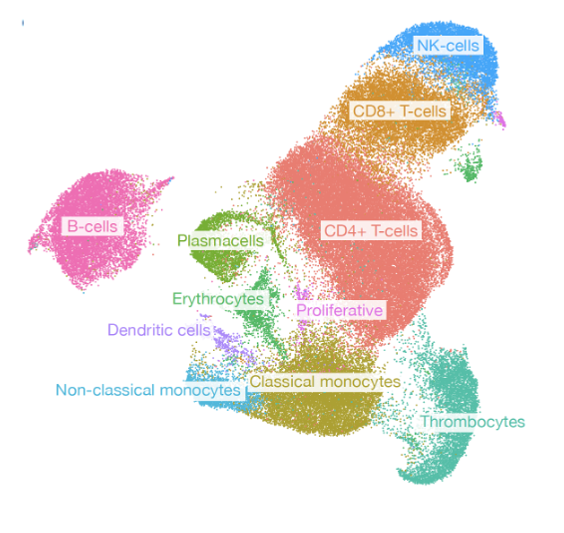Monocyte-driven atypical cytokine storm and aberrant neutrophil activation as key mediators of COVID-19 disease severity
Monocyte-driven atypical cytokine storm and aberrant neutrophil activation as key mediators of COVID-19 disease severity

- Epidemiological and clinical reports indicate that SARS-CoV-2 virulence hinges upon the triggering of an aberrant host immune response, more so than on direct virus-induced cellular damage. To elucidate the immunopathology underlying COVID-19 severity, we perform cytokine and multiplex immune profiling in COVID-19 patients. We show that hypercytokinemia in COVID-19 differs from the interferon-gamma-driven cytokine storm in macrophage activation syndrome, and is more pronounced in critical versus mild-moderate COVID-19. Systems modelling of cytokine levels paired with deep-immune profiling shows that classical monocytes drive this hyper-inflammatory phenotype and that a reduction in T-lymphocytes correlates with disease severity, with CD8+ cells being disproportionately affected. Antigen presenting machinery expression is also reduced in critical disease. Furthermore, we report that neutrophils contribute to disease severity and local tissue damage by amplification of hypercytokinemia and the formation of neutrophil extracellular traps. Together our findings suggest a myeloid-driven immunopathology, in which hyperactivated neutrophils and an ineffective adaptive immune system act as mediators of COVID-19 disease severity.
-
Monocyte-driven atypical cytokine storm and aberrant neutrophil activation as key mediators of COVID-19 disease severity. Vanderbeke et al., Nature Communications 2021.
Data availability
Raw sequencing reads of the scRNA-seq experiments generated for this study have been deposited in the EGA European Genome-Phenome Archive database (EGAS00001005039 for PBMC data accessible at: https://ega-archive.org/studies/EGAS00001005039; EGAS00001004717 for BAL fluid data accessible at: https://ega-archive.org/studies/EGAS00001004717). Requests for accessing raw sequencing reads will have to be reviewed by the UZLeuven-VIB data access committee. Any data shared will only be released prior to a Data Transfer Agreement that will have to include the necessary conditions to guarantee protection of personal data (according to European GDPR law).
Alternatively, a download of the read count data (with corresponding meta-data) is more readily available from this website.
